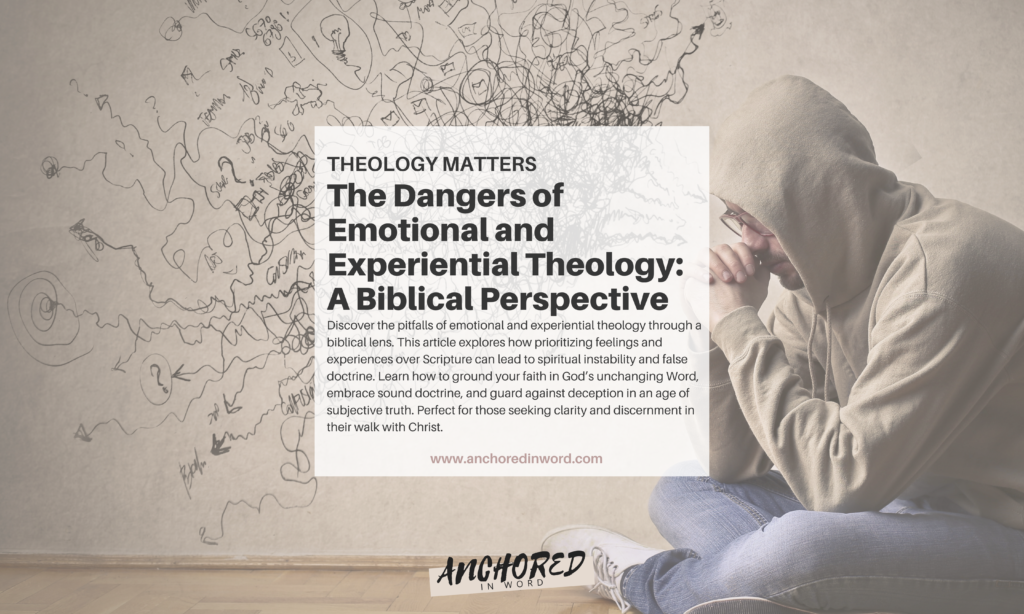
In an age where feelings and personal experiences often take precedence over biblical truth, the rise of emotional and experiential theology presents a significant challenge to the Church. Emotional theology elevates subjective feelings over the objective authority of Scripture, while experiential theology seeks validation of spiritual truth through personal encounters, signs, or wonders. Both are spiritually dangerous and undermine the sufficiency of God’s Word. Scripture not only warns against these tendencies but also connects them to the deceptive tactics of the Antichrist and false prophets in the last days.
Table of Contents
The Authority of Scripture Over Feelings and Experiences
The Bible is clear that God’s Word, not human emotions or experiences, is the ultimate authority for faith and practice. “All Scripture is breathed out by God and profitable for teaching, for reproof, for correction, and for training in righteousness” (2 Timothy 3:16). Feelings are subjective and changeable, often shaped by circumstances, while Scripture remains eternal and unchanging.
When believers prioritize feelings over Scripture, they risk distorting the gospel. For example, someone might conclude that God approves of a particular action because it “feels right,” even if it contradicts clear biblical teaching. Proverbs warns against this mindset: “There is a way that seems right to a man, but its end is the way to death” (Proverbs 14:12). Emotional theology shifts the focus from God’s unchanging character to the instability of human desires, leading to spiritual confusion.
Experiential Theology and Its Risks
Experiential theology seeks evidence of God’s presence or approval through personal encounters, miracles, or supernatural signs. While God does use miracles and wonders to confirm His power and authority, they are never meant to be the foundation of faith. Jesus rebuked those who demanded signs, saying, “An evil and adulterous generation seeks for a sign” (Matthew 16:4). Genuine faith is rooted in God’s Word, not in outward displays.
Relying on experiences can lead to deception. Satan, described as the “father of lies” (John 8:44), can mimic signs and wonders to mislead. When spiritual truth is judged by personal experiences rather than Scripture, believers become vulnerable to counterfeit manifestations.
Deception in the Last Days
The Bible warns that in the last days, emotional and experiential theology will pave the way for widespread deception. The Antichrist and false prophets will perform miraculous signs and wonders to lead people astray. “The coming of the lawless one is by the activity of Satan with all power and false signs and wonders, and with all wicked deception for those who are perishing, because they refused to love the truth and so be saved” (2 Thessalonians 2:9-10).
These deceptive signs will appeal to those who prioritize experiences over Scripture, confirming their biases while leading them further from God. Revelation describes the false prophet performing great signs to deceive the world into worshiping the beast (Revelation 13:13-14). This highlights the urgency for believers to ground their faith in God’s Word, not in sensational experiences.
Biblical Truth as the Safeguard
To avoid falling into the traps of emotional and experiential theology, believers must prioritize Scripture as their foundation. The Bereans in Acts 17 provide an excellent example: they “examined the Scriptures daily to see if these things were so” (Acts 17:11). Their faith was not based on Paul’s eloquence or miracles but on the truth of God’s Word.
Jesus Himself emphasized the importance of knowing Scripture to combat deception. When tempted by Satan, Jesus responded with, “It is written” (Matthew 4:4), demonstrating that truth from God’s Word is the ultimate defense against lies. Believers today must follow this example, testing every teaching, feeling, or experience against the authority of Scripture.
Living with Discernment in the Last Days
As we approach the end times, the Church must remain vigilant. False teachers will exploit emotional and experiential theology to distort the gospel and lead many astray. Paul warned Timothy, “For the time is coming when people will not endure sound teaching, but having itching ears they will accumulate for themselves teachers to suit their own passions” (2 Timothy 4:3).
Believers must cultivate discernment through the Holy Spirit and a deep knowledge of Scripture. This includes recognizing the sufficiency of Christ’s atoning work, rather than seeking validation through feelings or experiences. God’s Word is sufficient to equip us for every good work (2 Timothy 3:17) and to guard our hearts against deception.
Conclusion
Emotional and experiential theology may feel satisfying in the moment, but it is a dangerous foundation for faith. As Scripture warns, the Antichrist will exploit these tendencies, using false signs and wonders to deceive many in the last days. To stand firm, believers must ground their lives in the unchanging truth of God’s Word. True faith is not swayed by feelings or reliant on experiences but rests securely in the finished work of Christ and the promises of Scripture. As we anticipate Christ’s return, let us remain steadfast, vigilant, and deeply rooted in His truth.
